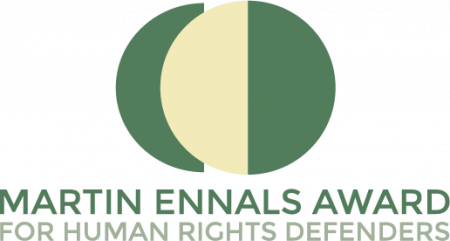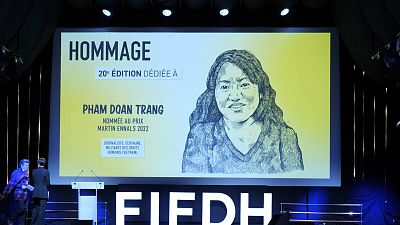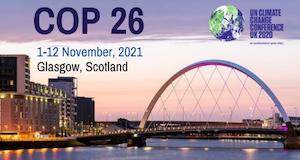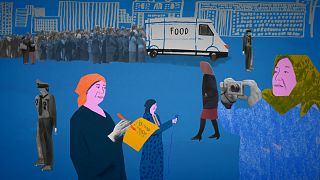The International Service for Human Rights (ISHR) and 12 other NGOs gave a joint assessment of the 51st session of the Human Rights Council which was held from Monday 12 September to Friday 7 October 2022. [see also: https://humanrightsdefenders.blog/2022/09/20/human-rights-defenders-at-the-51st-session-of-the-un-human-rights-council/]
We welcome that for the first time, the Council heard from two representatives of directly impacted communities from the podium in the enhanced interactive dialogue with the High Commissioner and the International Independent Expert Mechanism to Advance Racial Justice and Equality in Law Enforcement: Collette Flanagan of Mothers against Police Brutality (MAPB) whose son was killed by United States‘ police in 2013; and Jurema Werneck, director of Amnesty International in Brazil. As highlighted in the HC’s report, States are continuing to deny the existence and impact of systemic racism, especially institutional racism. Our view is that States actively protect the interests of police institutions in order to maintain the status quo which is designed to oppress Africans and people of African descent. We call on States to fully implement the Durban Declaration and Programme of Action (DDPA), to fully cooperate with the International Independent Expert Mechanism to Advance Racial Justice and Equality in the context of Law Enforcement including accepting country visits, implement the recommendations from their report and the High Commissioner’s Agenda towards Transformative Change for Racial justice and Equality.
We welcome the ‘from rhetoric to reality: a global call for concrete action against racism, racial discrimination, xenophobia and related intolerance’ resolution. The resolution, interalia, strongly condemns the discriminatory treatment, unlawful deportations, excessive use of force and deaths of African migrants and migrants of African descent, including refugees and asylum-seekers, at the hands of law enforcement officials engaged in migration and border governance. It calls on States to ensure accountability and reparations for human rights violations at borders and to adopt a racial justice approach, including by adopting policies to address structural racism in the management of international migration. It reiterates that the Transatlantic Trade in Enslaved Africans and colonialism were grave violations of international law that require States to make reparations proportionate to the harms committed and to ensure that structures in the society that are perpetuating the injustices of the past are transformed, including law enforcement and administration of justice and to dispense reparatory justice to remedy historical racial injustices…..
We welcome the resolution on the “human rights implications of new and emerging technologies in the military domain” and its request for a study examining these implications. The adoption of the resolution adds to the growing attention that UN human rights mechanisms are paying to the negative human rights impacts of arms, including new technologies that can be weaponised. It is undoubtable that concerns relating to the military domain should not be seen as only relevant to disarmament fora. In response to comments from some States on whether international humanitarian law (IHL) falls within the remit of HRC, we recall that international human rights law and IHL are complementary and mutually reinforcing, as the HRC itself has reiterated on several occasions in past resolutions. We welcome the inclusion of paragraph on the responsibility to respect human rights of business enterprises, and in this regard, we recall the Information Note by the UN Working Group on Business and Human Rights on the Arms Industry (“Responsible business conduct in the arms sector: Ensuring business practice in line with the UN Guiding Principles on Business and Human Rights”) published in August 2022. While we welcome the reference in the resolution to the role of human rights defenders and civil society organisations in raising awareness about the human rights impacts of the use of new and emerging technologies in the military domain, we regret that it does not include a specific mention of the risks that the use of these technologies can pose for human rights defenders and civil society organisations.
We welcome the resolution on arbitrary detention and especially the inclusion of a new paragraph on the necessity to fully implement the Declaration on Human Rights Defenders. The resolution recognises the role of HRDs, peaceful protesters, journalists and media workers in safeguarding the prohibition of arbitrary deprivation of liberty and calls upon States to make sure that they are not arbitrarily detained as a result of their activities. We further commend the main sponsor, France, for having rejected any language that could have weakened the resolution, especially on the right to legal assistance.
We welcome the adoption of the safety of journalists resolution. It has now been a decade since the first resolution on this topic, and the HRC has since created an elaborate and robust set of international standards to protect journalists. This iteration of the resolution adds new strong commitments on multiple new and emerging issues affecting journalists, from strategic lawsuits against public participation to extraterritorial attacks. It also strengthens language on investigations into attacks against journalists, calling on authorities to exhaust lines of enquiry that determine whether such attacks are linked to their journalistic work. We now urge States to implement these commitments to their full extent.
We welcome the approval by consensus by the Council of the resolution on terrorism and human rights, that has been updated with important paragraphs related to the centrality of the rule of law and human rights to counter terrorism, international human rights obligations in transfers of terrorist suspects, profiling of individuals, detention, the right to a fair trial and other due process guarantees, the right to privacy and freedom of expression, and in relation to children rights and civil society. We regret that paragraphs stemming from security based concerns have increased even though they are unrelated to the competence of the Council to promote human rights.
We warmly welcome the adoption of the resolution on the human rights situation in the Russian Federation, mandating a Special Rapporteur on Russia for the first time. …The Russian Federation’s growing repressive policies, combined with the country’s exclusion from the Council of Europe – victims of new human rights violations committed by the Russian Federation from 17 September lost protection under the European Convention on Human Rights– and its diplomatic isolation from those States which have been supportive of human rights and civil society in Russia, have made it increasingly difficult for Russian human rights defenders, activists, and civil society organisations to engage with the international community. Russian civil society had been vocal in calling for a Special Rapporteur’s mandate, strongly believing it will help to create a bridge between the United Nations and Russian civil society and the wider general public in Russia at an acute moment of widespread domestic human rights violations, both ensuring their voice is heard at an international level, and that the United Nations can further develop its understanding and analysis of the deterioration in Russia’s domestic human rights situation and the implications that has had – and continues to have – for Russia’s foreign policy decisions.
We welcome the extension and strengthening of the OHCHR capacity to collect, consolidate, analyse and preserve evidence and information and to develop strategies for future accountability, as well as to extend the mandate for enhanced monitoring and reporting by the OHCHR on Sri Lanka. Given the complete lack of any credible avenues for accountability at the national level, the OHCHR’s Sri Lanka Accountability Project remains the only hope of justice, more than thirteen years after the war, for thousands of victims of war time atrocities and their families.
We welcome the UN Secretary General’s report on missing people in Syria; and urge States to support and implement the report’s findings, in line with resolution A/HRC/51/L.18 which underscored “the report’s finding that any measure towards addressing the continuing tragedy of missing persons in the Syrian Arab Republic requires a coherent and holistic approach going beyond current efforts, which must be inclusive and centered on victims”. Addressing the issue of missing persons in Syria requires a “new international institution” mandated to clarify the fate and whereabouts of missing persons, to “work in cooperation and complementarity with existing mechanisms”, the body having “a structural element that ensures that victims, survivors and their families […] may participate in a full and meaningful manner in its operationalization and work” as recommended in the study of the Secretary General.
The Council has taken a vitally important step in renewing the mandate of the Fact-Finding Mission on Venezuela and of the reporting mandate of OHCHR for a further two years. In its most recent report, A/HRC/51/43, the Fact-Finding Mission deepened its investigation of alleged crimes against humanity, making clear that alleged perpetrators remain in power. The ongoing accountability drive through the work of the Mission allied with the work of OHCHR, is key to providing victims of violations with hope for justice. It is also key to the prevention of ongoing violations, particularly in the context of upcoming elections, and of encouraging political processes that respect human rights.
We regret that the Council failed to respond adequately to several human rights situations including Afghanistan, China, Philippines, and Yemen.
We welcome the extension and strengthening of the mandate of the Special Rapporteur on Afghanistan. However, this in no way makes up for the Council’s repeated failure to respond to the calls from Afghan human rights defenders, especially women human rights defenders, and civil society for an independent accountability mechanism with a mandate and resources to investigate the full scope of violations abuses that continue to be committed in Afghanistan by all parties and to preserve evidence of these violations for future accountability. It is particularly concerning that despite the overwhelming evidence of gross violations and abuses in Afghanistan that the Council failed to muster consensus on even the bare minimum.
We deplore that this Council was unable to endorse the proposal for a debate on Xinjiang, after the UN identified possible crimes against humanity committed by the Chinese government against Uyghurs and Turkic peoples. Dialogue is a pillar of multilateralism, and is fundamental, even on the hardest issues. Despite the leadership of the core group and all 18 States who voted in favour, this Council looked the other way. We strongly condemn the 19 countries who blocked this proposal, and regret all the abstentions that enabled it. We particularly regret that leading OIC States Indonesia and Qatar, as well as Kazakhstan, Uzbekistan, Pakistan, the UAE, Côte d’Ivoire, Mauritania, Sudan, Gabon, Cameroon and Eritrea, decided to abandon Uyghurs and Muslim minorities in China. We command Somalia for being the only Muslim Council member to stand up for Muslim minorities. Uyghur and international human rights groups won’t give up efforts to hold China accountable. We urgently call on current and future Council members to support efforts to prevent the continuation of atrocity crimes in Xinjiang, and uphold this Council’s credibility and moral authority. [see: https://humanrightsdefenders.blog/2022/10/05/uyghur-issue-at-the-un-human-rights-council-will-there-be-even-a-debate/]
We are deeply disappointed that despite the High Commissioner’s clear recommendation and demands by victims and their families as well as civil society from the Philippines, the Council has failed to put forward a resolution mandating the High Commissioner to continue monitoring and reporting on the situation, allowing the Philippines to use the rhetoric of cooperation and the UN Joint Programme for Human Rights to window-dress its appalling human rights record without any tangible progress or scrutiny.
We are dismayed by an Item 10 resolution that will not allow for reporting to the HRC on the human rights situation in Yemen. Despite a truce that now looks in danger of collapsing, the humanitarian and human rights crisis in Yemen has not ended. …Lasting peace in Yemen requires a sustained commitment by the international community to ensure accountability and redress for the millions of victims in Yemen. We call on UN member states to give meaning to the pledges they have made and begin to work toward the establishment of an international independent investigative mechanism on Yemen.
On 10 October 2022 a Blog post of the Universal Rights NGO gave the following quick summary of this session of the Human Rights Council
With Ms. Michelle Bachelet’s mandate as the UN High Commissioner for Human Rights having come to an end on 31 August 2022, and the incoming UN High Commissioner, Mr. Volker Türk, not taking up his official functions until 17 October 2022, Ms. Nada Al-Nashif, opened, as Acting High Commissioner, by presenting a global update on the situation of human rights around the world.
Four new Special Procedures mandate-holders were appointed to the following mandates: the Special Rapporteur on contemporary forms of racism, racial discrimination, xenophobia and related intolerance (India), the Special Rapporteur on the human rights of internally displaced persons (Colombia), the Special Rapporteur on the independence of judges and lawyers (United States of America), and one member of the Working Group on Arbitrary Detention (from Eastern European States).
9 expert members were elected to the Human Rights Council’s Advisory Committee (from Algeria, Angola, China, Qatar, Slovenia, Spain, Uruguay, Bahamas, Brazil).
42 texts (39 resolutions, one decision, and one statement by the President) were considered by the Council. This represents a 52% increase in the number of adopted texts compared to one-year prior (HRC48). Of the 41 adopted texts, 30 were adopted by consensus (73%), and 11 by a recorded vote (27%).
The Council rejected a draft decision to hold a debate on the situation of human rights in the Xinjiang Uyghur Autonomous Region, China by vote (17 votes in favour, 19 against, and 11 abstentions).
Following the adoption by vote of a draft resolution on the situation of human rights in the Russian Federation (17 votes in favour, 6 against, and 24 abstentions), the Council created a new Special Procedure mandate on the situation of human rights in the Russian Federation for a period of one year, and requested the mandate holder to make recommendations and to present a comprehensive report to the Council at its 54th session and to the General Assembly at its 78th session, while calling upon the Russian authorities to cooperate fully with the Special Rapporteur.
The Council further extended the mandates of 8 thematic Special Procedures (i.e., the Independent Expert on older persons; the Special Rapporteurs on the right to development, on contemporary forms of slavery, on the rights to water and sanitation, on Indigenous Peoples, and on the right to health, as well as the Working Groups on arbitrary detention, and on mercenaries), and 7 country-specific mechanisms (i.e., the Special Rapporteurs on Afghanistan, and on Burundi; the International Commission of Human Rights Experts on Ethiopia; the Independent International Fact-Finding Mission on the Bolivarian Republic of Venezuela, the International Team of Experts on the Democratic Republic of the Congo; the Independent Expert on the situation of human rights in the Central African Republic; and the mandate of the Independent Expert on the situation of human rights in Somalia).
25 written amendments were tabled by States ahead of the consideration of texts by the Council but 14 were withdrawn by the main sponsor prior to voting. The remaining 11 amendments were rejected by a vote. Additionally, one oral amendment was brought forward by China during voting proceedings.
31 of the texts adopted by the Council (79%) had Programme Budget Implications (PBI) and required new appropriations not included in previous Programme Budgets.
https://ishr.ch/latest-updates/hrc51-civil-society-presents-key-takeaways-from-human-rights-council/
https://www.universal-rights.org/urg-human-rights-council-reports/report-on-the-51st-session-of-the-human-rights-council/


















